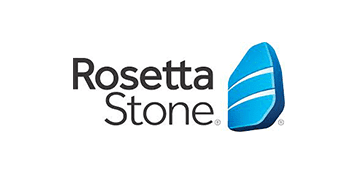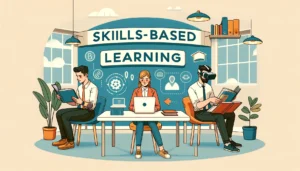-
Provided by

- Date published: Feb 19, 2024
- Categories
Does your organization need a corporate language training strategy?
When considering whether or not your organization needs a corporate language training strategy, there are some key considerations. Consider how it ties into your organization’s diversity, equity, and inclusion policies, and how providing business language training to your multilingual teams can enable your business success around the world. This article will examine both topics, clarifying the value of a language training strategy in maximizing international business impact and success.
What does diversity, equity, and inclusion mean to businesses?
Diversity, Equity, and Inclusion initiatives focus on creating inclusive policies and building a workspace that is intentional about the way it supports employees with a multitude of different characteristics. DE&I focuses on employees with disabilities, those from minority racial and ethnic groups, individuals of varying genders and sexual orientation, ages, religions, and cultures, to ensure that they are all given equal and fair opportunities at work. In recent years, DE&I departments have increasingly been a focus for large firms.
What effect have remote and hybrid work models had on DE&I?
Companies are increasingly trying to attract top-class international employees and engage clients from similarly diverse and multilingual backgrounds.
Advances in technology have transformed both the global business landscape and workplace culture. Increased connectivity, access to information, and collaborative software options have enabled companies to widen their searches for both employees and business opportunities globally and have given employees the option to seek remote employment opportunities. This shift has brought cultural diversity further into focus for modern-day business leaders.
How do multilingual teams contribute to business success?
Aside from constraining the geographical reach of an organization, homogenous business teams can limit the discussions that fuel innovation and progress. From a language and cultural standpoint, diverse teams are more effective at driving global mobility success, not only by creating opportunities to build business connections overseas but by understanding how to insert themselves in specific niche markets. Multilingual employees often have the cultural insights and sensitivities to adapt promotional strategies and messaging that resonate more effectively in different geographies and with culturally diverse communities.
Companies with inclusive hiring policies tend to outpace their competitors globally. Whether their goal is to build international brand awareness, deliver seamless customer service, or explore overseas procurement opportunities, cultural and linguistic diversity is increasingly recognized by business leaders as an important way to maintain a competitive advantage and build an appealing employer brand for employees in multiple regions and with different cultural profiles.
How does corporate language training fit into your DE&I strategies?
As companies grow and diversify, communication becomes more complicated. It’s important that multilingual employees feel engaged and that they can understand and contribute at work in the fullest way possible. DE&I professionals are increasingly becoming aware of the growing importance of corporate language learning o heal some of these communication gaps.
There are many ways in which corporate language training can support the success of an organization, especially where global mobility and international brand awareness are strategic priorities.
In his podcast series on the topic, Goldman Sachs veteran and Harvard Business School professor Robert Kaplan compares corporate monolingualism to a blindspot. He talks about some of the vital growth opportunities that stem from corporate language training and stresses the importance of investing in global talent development, especially where organizations are seeking to branch out and succeed overseas.
The advantages he lists of developing employee language proficiency have as much to do with learning the language itself, as they do with the secondary business benefits that come from embracing different cultures and perspectives. He describes the importance of defining a localized business strategy, vision, and set of priorities that aligns more closely with the customs and culture of communities in each region of the world. He emphasizes the importance of language learning as a way to develop this level of cultural awareness and connectivity.
Attract, retain, and develop skilled employees from around the world
When business leaders prioritize corporate language training, they create a workplace atmosphere in which multilingual employees feel welcome and empowered to succeed. A balance of corporate language training initiatives and mindful hiring policies help attract and retain top global.
Hiring managers who prioritize their own language skills development are often able to develop international business networks and engage, grow, and retain top talent to build business opportunities and support clients overseas. Rather than relying on globally mobile teams, Kaplan proposes the notion that investing in building relationships with local employees and business partners across the globe is ultimately more beneficial. This of course requires business leaders to build a significant level of proficiency in the language(s) that dominate regions where they’re aiming to prioritize business growth.
Build deeper connections with customers
While nourishing the sales funnel is important, an equally vital way to drive business success comes from renewed customer engagement and long-term satisfaction. Having a corporate language strategy here is important. It brings internal teams together for guidance and support with challenging client relations and enables your employees to forge deeper, long-lasting connections. Since language is the touchpoint to all human connections, there’s no more powerful way to build out your global business presence than by encouraging employees to learn and develop their skills in another language.
Building relationships of trust with existing customers, and staying abreast of their challenges and pain points will help your organization retain important clients and increase the number of referrals and endorsements that result from customer satisfaction. In turn, this releases pressure on the sales teams, allowing them to be more targeted in their approach to building pipeline and to free up time to learn new languages!
Demonstrate the value of your business to customers in different regions
Teams with local business knowledge are best placed to adjust value propositions and frame products and services in a culturally relevant way. Being able to create meaningful messaging for different cultures and communities builds an awareness of brand value, and accelerates global growth.
Improve communication across multilingual teams
Building out multilingual, remote, and geographically dispersed teams can also introduce new challenges. Effective communication across internal business teams is equally as important as external, client-facing communications. As companies grow and develop, it’s vital to retain consistency at a corporate level, and ensure that regional business teams remain connected, and that their promotional efforts are tied into the overarching business objectives and long term vision of the company.
Devise a clear communication strategy for multilingual teams
With multilingual teams in place, it’s important to cultivate a workspace in which employees of all backgrounds are able to thrive and collaborate with one another. An inclusive corporate communication strategy by definition, means that nobody faces exclusion on the basis of language. By committing to a culture of learning and language development, companies magnify the sense of belonging for every employee and fuel employee satisfaction, professional growth and business development. Whether you choose a corporate language, or focus on offering a range of languages to fuel employee collaboration, language learning is an employee benefit that will provide opportunities for both personal and professional connectivity through your corporate teams.
What is a corporate language?
Many companies with an international focus establish an official corporate language and offer language training to help non-native speaking employees develop the business communication skills they need. In this case, the language learning strategy is focused on one specific language, with the aim of aligning communication through diverse teams. Simply by engaging employees in the language learning process, connections are solidified between teams and employees who are not native to the corporate language feel empowered to succeed.
What is democratized language training?
Where there is no specific corporate language, and more a desire to build language proficiency through otherwise monolingual teams, companies who adopt a democratized language training approach find that they more quickly meet their desired objectives. Democratized language training ensures that equal opportunities for professional development are provided to every employee. It provides employees at all levels with the tools, space, and environment in which to learn a new language. In some cases there is a directive in terms of language training, and in others this is simply used as a way to build employee skills and raise the level of cultural awareness that supports business relationships and improves diversity in the workplace. When given the chance to select the best target language, many employees will consider the personal and professional opportunities their choice will afford them.
What should corporate language training cover?
The key to effective corporate language training is flexibility. Being able to provide employees with the freedom to choose an appropriate language and study anywhere, anytime is a major advantage. It is also important to consider the needs of employees at different levels of an organization. Particularly in companies that attract employees from all over the world, language training needs will vary as much in focus as in the languages themselves. Corporate language training programs should target the specific skills your employees need.
For those working on the factory floor or in construction, the priority focus may be to understand and give clear instructions, flag safety concerns, and learn how to operate new machinery in their target language. Employees working in marketing, sales and customer support, operations, HR or leadership will require different business communication skills in their target language. Employee needs range from routine communication skills for business travelers, to high-level business terms that enable employees to interact successfully in meetings or craft effective written correspondence, reports and presentations.
A successful corporate language training strategy accounts for the range of languages and levels needed by every business team, with personalized learning opportunities to support the business and industry-specific communication skills each employee requires for work. The best way to provide language training for modern day corporate teams is online. Rosetta Stone for Enterprise provides a personalized web and app-based learning experience, focusing on the needs of business learners in any industry. It offers live tutoring to build upon independent study and accelerate spoken fluency, and offers a powerful dashboard to measure the growth in employee language proficiency over time.







